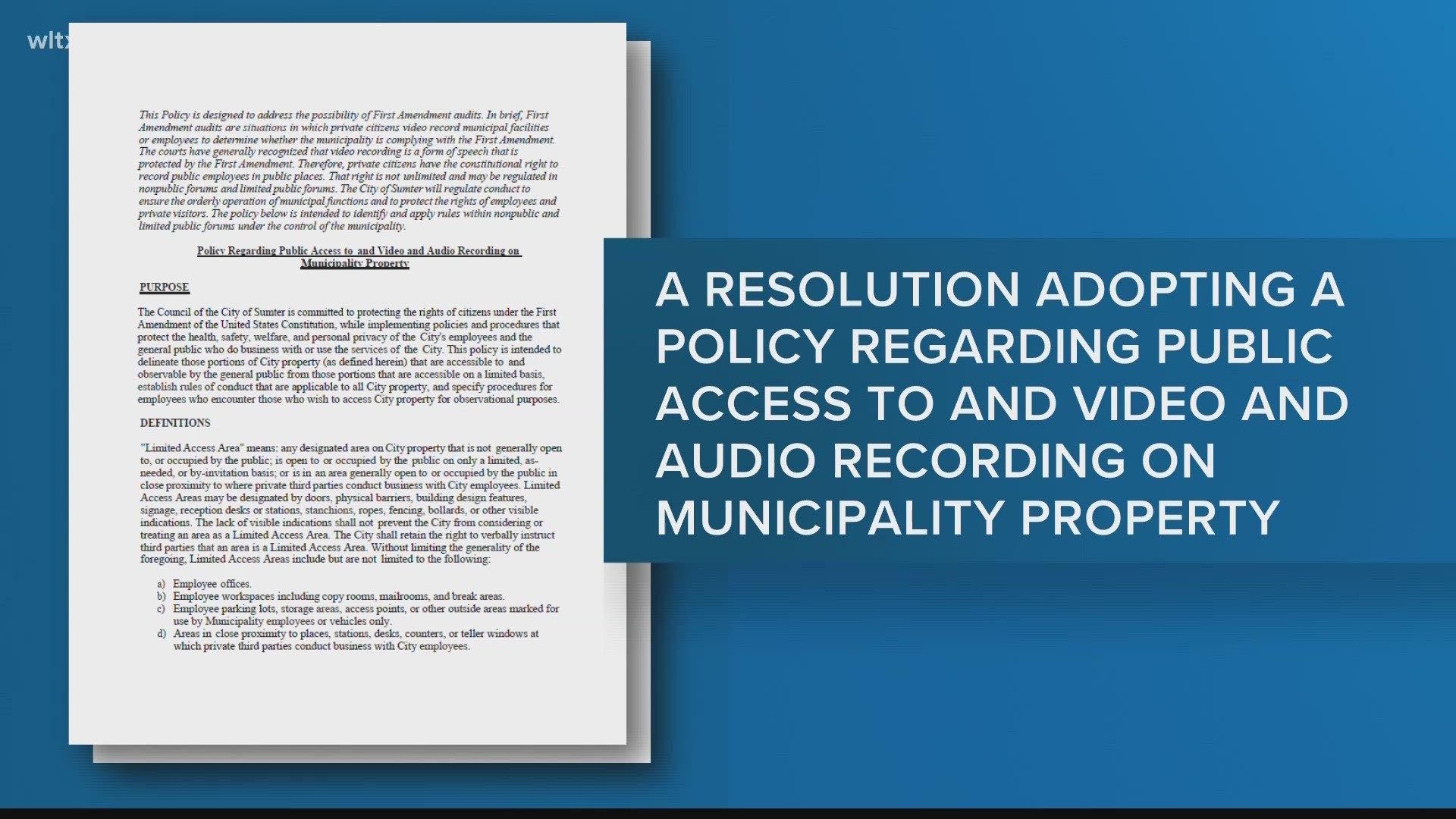SUMTER, S.C. — A new First Amendment policy has been passed by the Sumter City Council, designating spaces in the city’s municipality that citizens have access to.
“I think it's a good idea,” lifetime resident Linda Bracey shares.
Bracey says she hadn’t heard of this new First Amendment policy before today, but tells me she appreciates the council’s transparency.
“It's good that they kind of, like, let the community know what's going on,” Bracey explains.
Resolution No. 911 has passed, outlining where the public has access to be and where they can record when it comes to municipal property.
This is known as a “First Amendment audit.” As defined in the policy, “First Amendment audits are situations in which private citizens video record municipal facilities or employees to determine whether the municipality is complying with the First Amendment. The courts have generally recognized that video recording is a form of speech that is protected by the First Amendment. Therefore, private citizens have the constitutional right to record public employees in public places. That right is not unlimited and may be regulated in nonpublic forums and limited public forums. The City of Sumter will regulate conduct to ensure the orderly operation of municipal functions and to protect the rights of employees and private visitors.”
“We encourage people to come to the meetings all the time, and they'll have their phone out and videoing us and we want to encourage you know, people's First Amendment rights, but we also you know, want to protect our employees and protect our citizens,” Sumter Mayor David Merchant explains.”
Merchant says this comes as a recommendation from the South Carolina Municipal Association as he explains it’s increasingly common for citizens to try and record video or audio in private places, like in an employee’s office or a water facility.
“It seems like that's a growing trend across the country. And it's not just in Sumter or South Carolina. It's across the country,” Merchant shares. “We're just trying to be ahead of the game on that.”
Getting ahead by drafting a policy outlining the areas where the public does not have access to, that way Merchant says it can be enforced fairly and objectively to protect both citizens and city employees.
“If you don't have a policy in place, it can be trouble. And then if you put a policy in place, obviously people can question that as well. You know, there may be concerns there but we just want to have a policy in place that we're you know, as they come in and and officers come in, we can say ‘Hey, glad you're here, but we need you to stay in these designated areas,” Merchant details. “A First Amendment auditor may come in and want to go into a limited access area and then we try to stop that because it is a limited access area, but we didn't have a policy in place. So then that could have seemed arbitrary and capricious, you know, that you're just making this up.”
To avoid that, Merchant and the rest of the council approved this resolution.
“The First Amendment is one of, I would say, one of our most sacred amendments of the Bill of Rights,” attorney Lewis Warr shares. “The First Amendment is something that is very near and dear to all Americans. And without that it would be very hard for our government to work as it does and it would be very hard to elect public officials because you would have the people in power suppressing the right of the people to speak.”
Warr was not a part of creating this policy, but he did provide his legal opinion, saying he thinks the resolution strikes the right balance.
“I think that is narrowly tailored enough to where it doesn't violate the First Amendment rights of those individuals that want to do what's called a First Amendment audit, video public officials in their jobs, that's all well and good, but they can’t invade, you know, what they refer to as limited public areas such as shared office, private office spaces,” Warr explains. “Obviously, [city employees] still have to do their job. There's a balance between, you know, the person's right to come in and record and the municipality actually getting the work done that they need to. Whatever public office it may be, they have a job to do and if you come back into their private offices and make employees uncomfortable and make it a kind of a hostile work environment.”
According to the resolution, “limited access areas” are considered a designated area on city property that is “not generally open to, or occupied by the public.” That includes:
a) Employee offices
b) Employee workspaces including copy rooms, mailrooms, and break areas
c) Employee parking lots, storage areas, access points, or other outside areas marked for use by Municipality employees or vehicles only
d) Areas in close proximity to places, stations, desks, counters, or teller windows at which private third parties conduct business with City employees
e) Hallways, staircases, restrooms, elevators, and other areas by purpose or function restricted to limited or transitory occupancy or providing access solely to other Limited Access Areas
f) Maintenance, storage, and warehousing facilities
g) Public works and public safety buildings, except for any designated waiting or reception areas therein
h) Water, sewer, and other public utility facilities.
Access to these areas are limited to employees, elected or appointed officials and private parties who are invited into those areas.
In public areas, however, anyone is able to photograph, film or record.
When it comes to limiting the First Amendment, Warr says it is something to be wary of.
“We do have to be very vigilant and very, very thoughtful when we put limitations on the First Amendment,” Warr believes. “There's very limited circumstances where it will be appropriate for a government entity to limit someone's First Amendment rights.”

